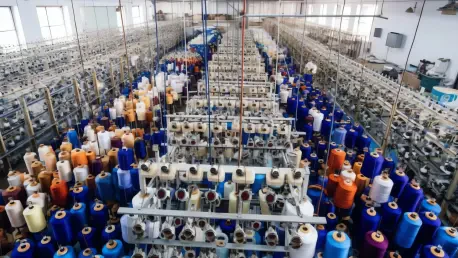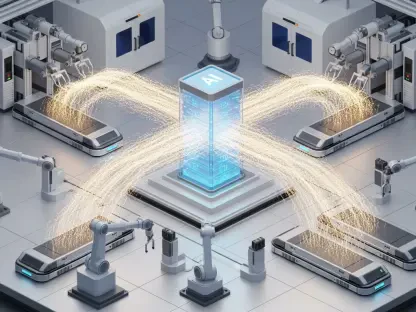The textile industry is a substantial consumer of the planet’s water resources, using approximately 93 billion cubic meters each year, accounting for roughly 4% of global fresh water consumption. This extensive use has led to increased scrutiny over its environmental impact and sparked a pressing demand for more sustainable methods. Sustainability is no longer just a matter of enhancing public image but has become a significant competitive edge for manufacturers striving to succeed in the market. The shift towards eco-friendly practices is growing, making sustainability a crucial aspect for businesses in avoiding regulatory pressures and ensuring long-term survival.
Textilcolor AG at the Forefront of Sustainable Transformation
Commitment to Future-Proof Textile Manufacturing
Textilcolor AG, a Swiss firm based in Sevelen, has emerged as a leader in the pursuit of sustainable textile dyeing solutions. For over 40 years, this company has been dedicated to innovating methods that minimize environmental footprint while maintaining high standards of quality. Their focus on future-proofing textile treatment processes has placed them at the forefront of the movement for environmentally conscious production. As conventional methods grapple with the challenges of diminishing resources and stricter regulations, Textilcolor AG’s approach is proving vital in ensuring the industry’s adaptability in a rapidly evolving market.
Pioneering Technologies Unveiled at ITMA ASIA + CITME
At the ITMA Asia + CITME exhibition, Textilcolor AG showcased groundbreaking technologies, including EcoDye and EcoFix, designed to drastically reduce water and energy usage. These innovations promise up to 71% reductions in water consumption and a 50% decrease in fossil fuel reliance during the production process. Detlef Fischer, CEO of Textilcolor AG, emphasized their alignment with the exposition theme “ECO Performance Technologies from Switzerland,” underscoring the company’s role as an innovator amid the ecological shift in textile manufacturing. Such advancements not only bolster their leadership status in sustainability but also transform the industry’s operational landscape.
Diverse Innovations and Their Impact
EcoDye: Transforming Polyester Dyeing
The EcoDye process is a unique development focusing on Polyester (PES) dyeing, representing an unprecedented step in sustainable dyeing technologies. It achieves a marked decrease in water use by up to 71% and energy consumption by 34%, thus producing an environmentally friendly system with a significantly reduced carbon footprint. By abolishing specific process steps and improving heating rates, EcoDye allows for faster processing times while maintaining compatibility with existing dye recipes. The technology’s bluesign® approval further reinforces its compliance with ecological regulatory standards, making it an appealing choice for businesses aiming to meet sustainability goals.
Seamless Integration with Existing Systems
One of the most notable strengths of EcoDye is its adaptability to current dyeing recipes, enabling seamless implementation without necessitating complete process overhauls. This compatibility offers a smooth transition for manufacturers eager to adopt greener practices without sacrificing efficiency or quality. Integrated with other Textilcolor technologies like EcoFix and EcoThren, which streamline reactive and vat dyeing, EcoDye achieves up to 40% reductions in processing times. These comprehensive solutions not only enhance production outputs and reduce costs but also improve the overall quality of textile products. The merger of multiple eco-friendly technologies results in significant economic and environmental benefits.
Enhancing Sustainability Across the Board
Supporting Technologies Bolstering the Dyeing Process
Beyond the core breakthroughs, Textilcolor AG provides an array of auxiliary products that support the dyeing process, including leveling and dispersing agents, and specialized items to prevent issues like oligomer agglomeration. These offerings help maintain stability and continuity throughout the dyeing process, ensuring steady operation even as businesses transition to more sustainable methods. Among these is EcoPhob, a PFC-free hydrophobic solution that delivers remarkable hydrophobic properties across various fibers, complying with the Öko-Tex standard class 1 product specifications. These supplementary products extend the company’s commitment to offer sustainable solutions that guarantee superior performance.
Comprehensive Approach to Textile Manufacturing
Textilcolor AG’s comprehensive range of products and solutions reflects a holistic approach to textile manufacturing, distinguishing them from competitors focused on isolated processes. Their dedication to addressing the full cycle—from pre-treatment, printing, dyeing, to finishing, coating, and incorporating optical brighteners—demonstrates a commitment to integrating sustainability at every stage. This overarching strategy positions Textilcolor AG as a pivotal solution provider driven by ecological, efficient, and forward-thinking production principles. Their ability to incorporate sustainable practices throughout the manufacturing process sets a benchmark for others in the industry to follow.
Reflections and the Path Forward
The textile industry is a major consumer of the world’s water resources, utilizing an estimated 93 billion cubic meters annually, which constitutes about 4% of the globe’s fresh water use. This significant consumption has invited increased scrutiny and sparked a growing demand for sustainable practices. Environmentally friendly approaches are no longer simply about boosting a company’s public image; they have become a crucial competitive factor for manufacturers aiming to thrive in today’s market. This shift towards sustainability is gaining momentum, driven by the need to avoid regulatory pressures and to ensure the industry’s long-term viability. Businesses are recognizing that eco-friendly practices offer not just compliance benefits but also opportunities for innovation and differentiation from competitors. As consumers become more environmentally conscious, manufacturers are incentivized to lower their environmental footprint by adopting more sustainable practices, thus securing their future and appealing more to eco-aware markets.









